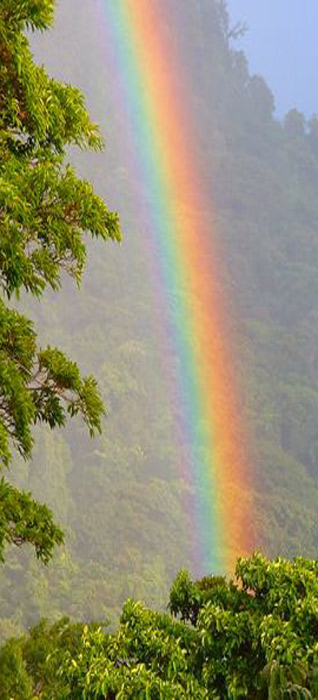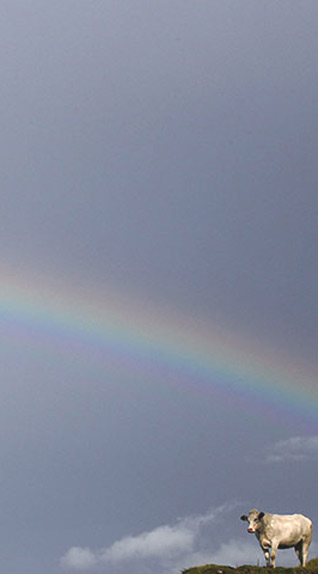Talking Stick
Ode to Joy:
The Talking Stick Colloquium # 96
ARDIS WHITMAN
Certain moments in our lives feel more radiant and meaningful than all others. So why do we rarely mention them?
It was a day in late June, grey with clouds hanging low.
My husband and I were driving to Nova Scotia (Canada) for a much-needed vacation, both of us more tired than we cared to admit. We travelled glumly, hoping to reach rest and dinner before the rain came.
Suddenly, on a lonely stretch of highway, the storm struck. The forest vanished in a great deluge. Cascades of water shut us in, making driving impossible.
We pulled off onto the shoulder.
Then, as though someone had turned off a celestial faucet, it ended. A thin radiance spread out from the clouds, catching the tops of the trees. Every blade of grass was crystalline. A rainbow arched across the sky. But more than that: on our right was a pond, and in the pond was the end of the rainbow.
We could hardly speak for awe.
A friend of mine has described a similar experience.
She had walked out on a lonely beach at twilight. It was a time of grief for her, and loneliness was what she wanted. Offshore was a single, low island. Presently she was aware of a dim light moving on it, and then came the splash of oars and the scrape of a boat leaving the shore. She made out the outlines of a fishing vessel, and in it the figure of a man. He rowed out a little way and anchored. After a while, my friend felt a glowing sense of oneness with that silent figure. It was as though sea, sky, night and those two solitary human beings were united.
“I was overtaken by joy,” she said.
Most of us have experienced such lighted moments, when we seem to understand ourselves and the world. But they vanish quickly, and we’re almost embarrassed to admit to them, as though in doing so we betray a willingness to believe in what isn’t true.
However, psychologist Abraham Maslow embarked in the late ‘30s on a study of average individuals and found that many report “moments of great awe; moments of the most intense happiness or even rapture, ecstasy or bliss.”
He concluded that these feelings are often the expression of buoyant health.
In his files, for example, is the story of a young mother. At breakfast time, she hurried about the kitchen pouring orange juice and coffee, spreading jam and toast. The children were chattering; the sun streamed in onto their faces; her husband was playing with the littlest one. All was usual. But as she looked at them, she was suddenly overcome by how much she loved them.
Here, too, is the story of a man who went swimming alone and recalls “the crazy, childish joy with which he cavorted in the water like a fish.”
He was struck by his great happiness at being “so perfectly physical.”
Apparently, almost anything may serve as the impetus of such joy -- starshine on the snow; a moment in a relationship when hand reaches out to hand in the realization that this other person feels as you feel.
Joy may wait, too, just beyond danger when you have enough to face a situation and live it out.
Whatever the source, joyous experiences provide the most memorable moments of human life.
Joy is much more than happiness. It’s “exultation of spirit,” says the Oxford English Dictionary, “gladness; delight; a state of felicity.”
Awe and a sense of mystery are part of it; so are feelings of humility and gratitude or a sense of “melting into” the unity of things. But the most important part of these peak experiences, says Maslow, is the feeling that one has really glimpsed “the secret of life, as if veils had been pulled aside.”
“To miss the joy is to miss all,” wrote Robert Louis Stevenson.
The sad thing is that it happens to most of us so rarely. As we grow older, our lives become buried under the pressures of the workaday world. Joy isn’t likely to come to us when we’re going round the circle of our own busyness and our own importance.
How can we restore joy to our lives?
Sometimes all that’s needed is a chance to see an old experience in a new way. We need to foster the wonder of discovery, because joy often comes from creativity and insight.
Handel, for instance, wrote his Messiah in 24 days. Working morning, noon and night, he hardly touched the food set before him. When he’d finished Part 2, which contains the “Hallelujah Chorus,” he rushed to the window, and his servant heard him cry, “I did think I did see all heaven before me and the great God Himself!”
Perhaps we’re more likely to experience a moment of joy if we can acknowledge a world greater than our own. To be sure, joy isn’t necessarily religious in any conventional way. But it does make people feel, like Handel, that they’ve touched the hem of something beyond themselves.
Most of all, joy may come when we don’t run from life, with its sorrows, struggles and hopes. When transiency and frailty are omnipresent, what we have grows sweeter.
I remember once finding myself seated beside an old gentleman on a train. He sat quietly looking out of the window. His eyes searched each leaf, each cloud, the lines of passing houses.
“It is beautiful, isn’t it?” I ventured at last, intrigued by his absorption.
“Yes,” he said, and no more for a moment. Then he smiled and waved a hand at a passing hay wagon. “See,” he said, “hay going to the barn.” And he made it sound as though there could be no greater event in all the world.
He saw the unspoken question in my face.
“Last week,” he said, “the doctor told me I have only three months to live. Ever since, everything has looked so beautiful and important to me. I feel as though I’d been asleep and had only just woken up.”
What if these moments are given to us to reveal that this is the way we’re meant to live? What if the clarity of joy is the way we should be seeing all the time?
To many of us, it seems almost wrong to feel this radiance in a world as threatened as ours is. But most generations have known uncertainty and peril.
The more uncertain the world, the more we need to remember it.
THE TALKING STICK COLLOQUIUM # 96
Have you had any such experiences of your own in your life -- moments of joy! -- that you can share with the readers?
[Article, courtesy: Reader’s Digest]
January 4, 2013
Conversation about this article
1: Prakash.Singh Bagga (Indore, MP, India), January 06, 2013, 10:59 AM.
Yes, I had a great moment of joy when my grand-duaghter was born on January 26. We are three brothers and no sister. Then I had two sons, no daughter. The birth of a grand-daughter was really a great moment of joy for all of us as we had a little girl baby in our family, finally, in the third generation. So we named her "Tamanna".




